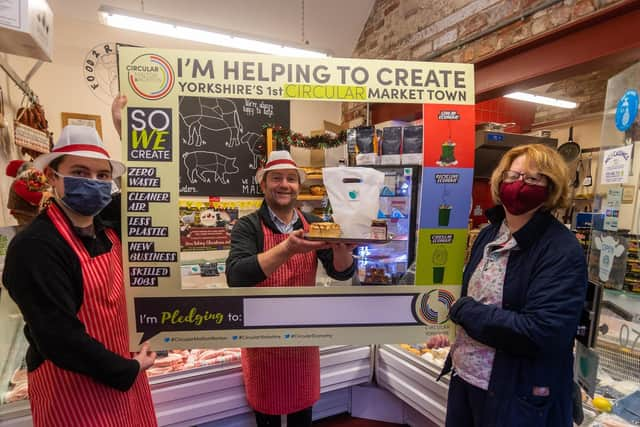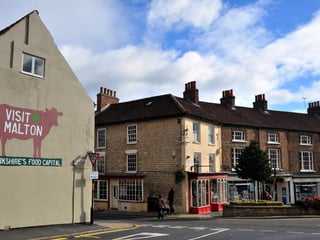How the 'circular economy' could help re-ignite North Yorkshire's market towns
But just as the pandemic has forced many to reconsider the fundamentals of their working culture, an alternative is emerging as consumers try to reconcile their buying habits with growing environmental concerns.
And the concept of a circular economy - where the emphasis is on keeping resources in use for as long as possible instead of just disposing of them - is starting to gain traction in North Yorkshire.
Advertisement
Hide AdAdvertisement
Hide AdThe new philosophy has attracted strong support in Malton and Scarborough and could play a part in the long-held ambition held by leaders to establish a carbon-negative economy - where England's largest county removes more carbon dioxide from the economy than it creates - by 2040.
Groups dedicated to promoting the idea have sprung up in both towns and though there is still a way to go for it to become established, there are high hopes that in 2021 it could really take off.
Sue Jefferson, one of the founders of the Circular Malton and Norton group established in 2019, believes cities, towns and rural areas can all benefit from the circular economy, as can the young and old, individuals and businesses.
The CEO of business consultancy Possibilities Realised cites the example of Malton butcher Paul Potts, who has learned to work with the food waste app Too Good To Go.


Advertisement
Hide AdAdvertisement
Hide AdRather than throwing his surplus meat away at the end of the day, he puts it in a so-called 'magic bag' where users of the app can buy it for a third of the normal price, though they don't know exactly what they will get.
On a larger scale, a feasibility study for a community-based anaerobic digester plant which will use local food and agricultural waste to create heat and energy for Malton and Norton is near completion.
And local businesses now have access to a simple-to-use tool to work out their carbon footprint, helping them to prioritise areas for improvement.
Recent research has shown that local residents have low awareness of the circular economy, but once explained, they endorse it. And Ms Jefferson hopes that Malton can use the concept to become a resource-efficient market town, acting as a pilot for Yorkshire and the UK.
Advertisement
Hide AdAdvertisement
Hide AdShe said: "There's a need to have people work in partnership so that might be businesses working with each other, or public and private partnerships.
"And the idea was, can we do that on a relatively small scale and see if it can work because actually then we can have a model and roll it out, we've got so many market towns across North Yorkshire, this will be a great way and it's doing it bottom up.
"And also because market towns in rural areas are struggling, we're on the way down, so this could be something that just captures the imagination and re-ignites market towns."
Paul Potts, owner of Malton butchers Food2Remember, is a big believer in minimising food miles, and knows the farms that his meat, eggs and cheese come from.
Advertisement
Hide AdAdvertisement
Hide AdAlthough he hadn’t previously heard of a circular economy, he says the concept of minimising waste and collaborating with other businesses so valuable resources go further, made perfect sense.
Herecently worked with Malton’s greengrocer Paleys, the Yorkshire Pasta company and The Cook’s Place to provide 200 school meals during the holidays.
Mr Potts, whose son Kiran also works in the shop: said “I’m keen to see the development of the proposed community anaerobic digester so the town’s inedible food waste can be converted to heat and power homes locally.”
Food2Remember was one of the first food businesses in Malton to sign up to the circular App Too Good To Go. With £9 worth of food, safe useable but nearing best before date, popped into a magic bag, the shopper uses the App code to buy it for £3. Now, not only is there much less food waste, saving carbon emissions but new customers have discovered his shop.
Advertisement
Hide AdAdvertisement
Hide AdThe York and North Yorkshire Local Enterprise Partnership, responsible for economic growth, is behind the idea and last month launched a 'circular Yorkshire' month to raise its profile.
A LEP briefing for The Yorkshire Post describes how "transitioning to a circular economy will also help us to build back better from the pandemic".
It says: "By adopting circular economy, businesses will be able to increase profits through resource efficiency, increase their brand and product appeal to customers through leveraging sustainable, circular credentials and by taking a local approach to supply chains, will become more resilient and less at risk of future destabilisation."
And across Malton and Scarborough individual businesses and organisations are starting to embrace the concept.
Advertisement
Hide AdAdvertisement
Hide AdIn and around the seaside town there is a rich network of independent traders, used and second hand shops, community fridges, climate activist groups, upcycling community businesses, forestry and food-growing projects and new businesses such as Seagrown - which is behind a pioneering seaweed farm - explicitly founded on circular principles.
Mel Bonney, the Chief Executive of Coast and Vale Community Action (CaVCA), a social enterprise based in Scarborough which derives income from its community
buildings in Scarborough and Whitby, is playing a leading role in pushing the idea forward locally.
Coastal communities have generations of experience of making the most of the resources they have at hand and in exploring the idea of Circular Scarborough CaVCA will work alongside those communities to achieve the things they want to achieve.
Advertisement
Hide AdAdvertisement
Hide AdShe said: "One of the more interesting ones is Scarborough and Ryedale Community Cycling, who are not only opening up the world of cycling to people but also repairing and reusing and remodelling bikes. A lot of it is about getting back to the more traditional reuse ways."
Her organisation is also behind the 'free fridge' movement in Ryedale and Scarborough, where community fridges are set up to save vast amounts of edible food from being deposited into landfill.
Ms Bonney said: "We're quite keen to see the development of the circular economy because it is actually also about poverty alleviation.
"As a charity we were set up over 100 years ago as a traditional poverty alleviation charity, so when you talk about community resilience and why is CaVCA interested in circularity it is about that, that poverty alleviation and community resilience side of it."
Comment Guidelines
National World encourages reader discussion on our stories. User feedback, insights and back-and-forth exchanges add a rich layer of context to reporting. Please review our Community Guidelines before commenting.
